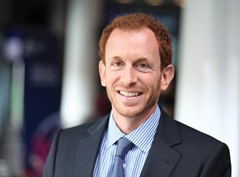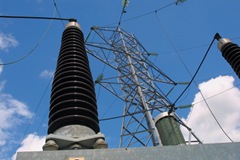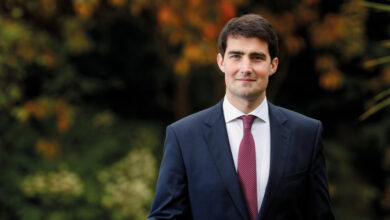Universal energy access: UNIDO
 Morgan Bazilian, Special Adviser to the Director General of the UN Industrial Development Organisation (UNIDO) and former adviser to Eamon Ryan, discusses how UNIDO is working to help governments in developing countries provide energy to large populations who are without power.
Morgan Bazilian, Special Adviser to the Director General of the UN Industrial Development Organisation (UNIDO) and former adviser to Eamon Ryan, discusses how UNIDO is working to help governments in developing countries provide energy to large populations who are without power.
Energy is becoming a priority for the UN, according to Morgan Bazilian, who spoke at the annual Energy Ireland conference in June. Three billion people (half the world’s population) are without access to everyday energy for cooking, cleaning and heating their homes; therefore, UNIDO is working with developing countries in sub-Saharan Africa and India to alleviate this problem.
Explaining the UNIDO’s work, Bazilian told eolas: “It focuses on capacity building for people and institutions;
building good institutions, educating people and helping with policy and regulation. To create investment climates for whatever is appropriate in those countries so they can get both foreign and direct investment and appropriate development assistance.”
The UNIDO’s aspirational goal is to have “universal access to modern, clean forms of energy by 2030.” Its work in sub- Saharan Africa is relevant to Europe because European member states face the threat of mass emigration from a young, poor and unemployed neighbour in the near future, Bazilian contends.
“You have a huge population of young people in sub-Saharan Africa and they, like all young people, are looking for enjoyable, healthy productive lives which means work,” he told eolas. “If they can’t find work then you see everything from political unrest, to violence, to high urbanisation rates, to – like Ireland has seen – emigration.”
The UNIDO believes that one of the important contributing factors to making sure jobs exist in Africa is “having some sort of stable energy base.” Bazilian explained that it’s not just about providing energy to homes to allow families to be educated and to “improve their lives”, but it is essential that companies become productive in order to reduce the country’s poverty.
Energy
Sub-Saharan Africa is renowned for its “ridiculously low installed capacity,” Bazilian noted.
In that region, 800 million people have a total of 68 GW of energy (of which 25 GW of capacity is “not working properly” due to aging plants and lack of maintenance.) In comparison, Ireland has 7 GW for five million people.
In addition, manufacturing enterprises experience power shortages on an average of 56 days per year compared to Ireland’s loss of load expectation of eight hours per year, Bazilian told conference delegates.
“Given the region’s low levels of generation and access, it is not surprising that per capita consumption of electricity averages just 457 KWh annually, with the average falling to 124 KWh if South Africa is excluded,” Bazilian continued. “By contrast, the annual average per capita consumption in the developing world is 1,155 KWh and 10,198 kWh in high- income countries.”
If South Africa is excluded, Bazilian explained, sub-Saharan Africa is “the only world region in which per capita consumption of electricity is falling.” He clarified: “This is why we care about the developing world.”
 Developing countries such as sub- Saharan Africa are “brutally aware” of their situation, Bazilian contended. However, they are constrained by “governance, human capacity and cash,” he told eolas.
Developing countries such as sub- Saharan Africa are “brutally aware” of their situation, Bazilian contended. However, they are constrained by “governance, human capacity and cash,” he told eolas.
Countries in the region have set targets, they have “very sophisticated” regional trading plans and plans for power pools, but they need support.
One way in which the UNIDO plans to help is by researching whether smart grids that have been successful in developed countries could be designed differently in order to get power to these countries quickly.
Bazilian explained the UNIDO’s thought process. “If countries like Ireland are taking leadership positions in technology and operation of their grids through smart grids, can we take any of the systems or tools or concepts of smart grid and leap- frog over how we did it in Ireland or the United States, so we don’t have to do it the same way?”
He told delegates that “there is a possibility for enormous markets in this space, whether you’re looking at ICT aspects of smart grids or basic metering, tariff or operation of grids aspects.”
The way future power systems are planned, designed, constructed, financed and operated will have a significant impact on how effectively these aspirations are delivered, he added. Ultimately, the UNIDO believes that “these smart grid advances may enable sub‐Saharan African countries to leapfrog elements of traditional power systems in terms of both technology and regulation.” This could “accelerate national and regional electrification timeframes, improving service delivery, minimising costs and reducing environmental impact,” he contended.
The organisation refers to the concept as ‘just grids’, which they hope would “reflect the need for power systems to contribute towards equitable and inclusive global, economic and social development and would help guarantee access to modern energy services without marginalising the poor.”
When asked how sustainable energy can be achieved in developing countries Bazilian replied: “The main components are making sure that the national and regional plans that are in place are appropriately designed, refined and financed so that the countries and regions can get on with the things they want to do.”
He added that the second thing is to “build the capacity and need to run and implement it over the long-term and allow the investment to flow over the long- term.”
He concluded that his answer “is not dissimilar to the kind of answer you would give anywhere else” but added that “the scale of the issue is so much greater than what you run into here.”





